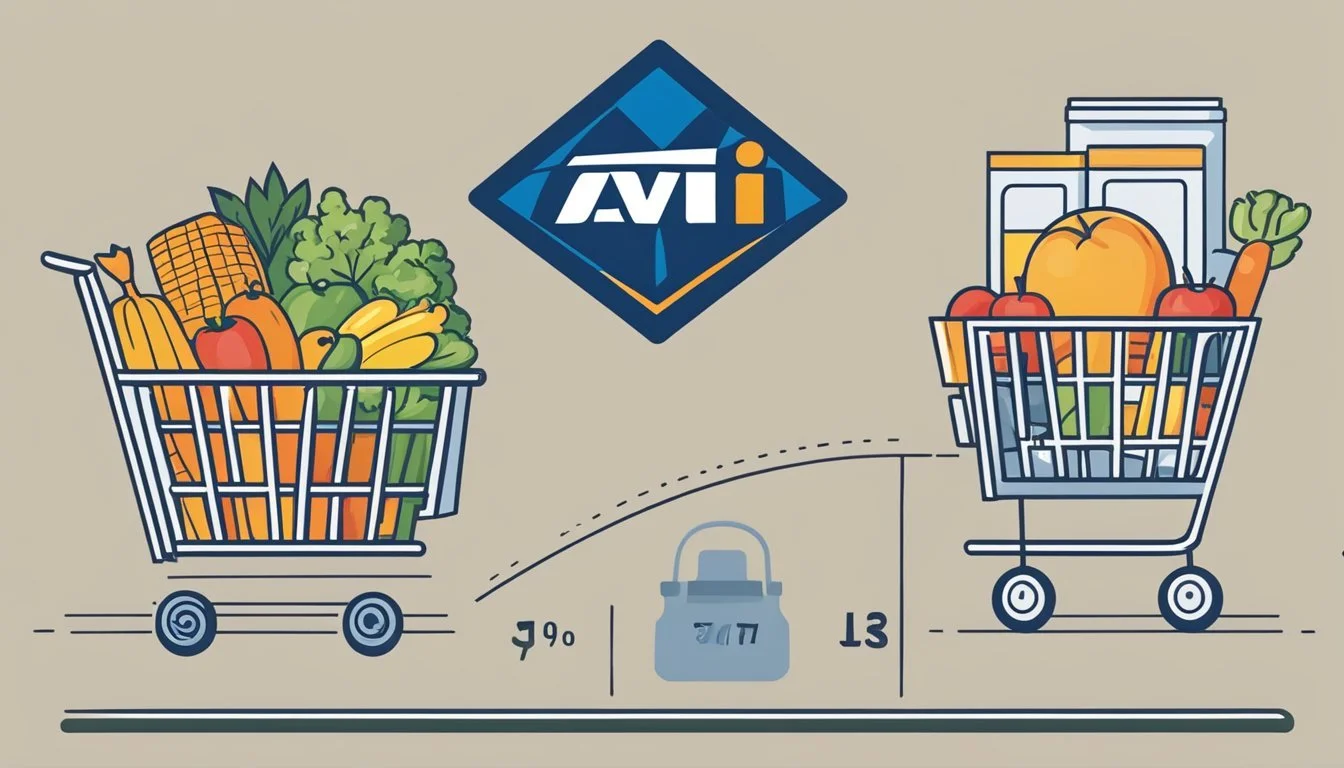Aldi vs Wegmans
Comparing Quality, Prices, and Experience
When grocery shopping, consumers are faced with numerous choices, each store promising quality products and excellent value. Aldi and Wegmans represent two ends of the supermarket spectrum, appealing to different shopper priorities. Aldi, a German discount supermarket chain, has garnered a strong following for its low prices and efficient shopping experience. It's known for its cost-effective approach to groceries, offering mainly private labels and a no-frills shopping environment which can lead to significant savings for budget-conscious customers.
Wegmans, on the other hand, is recognized for its wide selection of goods, ranging from basic household essentials to gourmet and organic offerings. With its emphasis on customer experience, Wegmans often includes a variety of in-store dining options and a focus on customer service. They also provide a more conventional supermarket setup compared to Aldi’s minimalist approach. Wegmans often caters to shoppers who prioritize quality, variety, and a more traditional shopping experience, even if it means spending a bit more.
Both Aldi and Wegmans have their merits, and choosing the better grocery store frequently depends on individual needs and preferences. For those prioritizing their wallet, Aldi typically emerges as the best option. Meanwhile, Wegmans may appeal to those who value a broad selection and an enjoyable shopping environment. Each store's business model caters to distinct segments of the market, making them both top contenders in their respective niches.
Company Histories
Aldi is a leading international discount supermarket chain that was originally founded by brothers Karl and Theo Albrecht in 1946. It is known for its cost-effective approach to grocery selling and unique store practices such as a cart rental system and an emphasis on exclusive brands. Starting in Germany, Aldi's name is a contraction of Albrecht and Discount. Aldi operates over 10,000 stores globally, part of which exists under two distinct groups: Aldi Nord and Aldi Süd. Aldi’s expansion into the U.S. market has it competing aggressively against more established supermarkets.
Wegmans began as a small fresh produce stand in 1916, founded by John Wegman and his brother Walter in Rochester, New York. This small stand quickly evolved into Rochester Fruit & Vegetable Company, which set the foundation for Wegmans Food Markets. Over the years, Wegmans has built its reputation on customer service, offering an extensive selection of goods, and the high quality of its store brands. With a smaller number of stores than Aldi, specifically, Wegmans has over 100 stores located primarily in the Northeast and Mid-Atlantic regions of the U.S. Its focus remains on creating a unique shopping experience, with larger-than-average stores and a strong emphasis on an expansive range of products.
Both retailers have significantly different histories and strategies but share a common goal: to provide a quality shopping experience in the competitive grocery store market. While Aldi grocers have thrived on simplicity and efficiency, Wegmans positions itself as a one-stop supermarket with a focus on customer satisfaction and a variety of products. The stores operated by these retailers reflect their distinct histories and marketing philosophies within the retail industry.
Store Brands vs National Brands
When considering Aldi and Wegmans, the quality of store brands and the availability of national brands fundamentally influence shopper preferences and loyalty towards each grocery chain.
Quality of Store Brands
Wegmans tends to offer a wide range of high-quality store branded products, branded as Wegmans brand, which is often positioned as a direct competitor to national brands in terms of taste and quality. They offer numerous organic and specialty items that cater to a more premium market segment.
Aldi, on the other hand, is known for its Simply Nature line, among others, which offers organic and non-GMO options. The quality of Aldi's store brands is frequently cited as a compelling reason for their customer loyalty, as they manage to deliver affordability without significant compromise on quality.
Selection of National Brands
In contrast to their store brands, Aldi stocks a comparatively limited selection of national brands. They focus primarily on their private labels, which allows them to maintain lower prices across the board. Customers looking for the traditional brands they have grown to trust might find Aldi's selection lacking.
Wegmans offers a broader selection of national brands alongside their own products. Shoppers who are not ready to switch completely to store brands may find comfort in the familiar packaging of national brands like Great Value lining the Wegmans shelves. The availability of these brands makes Wegmans a more attractive option for those who prefer not to deviate from the brands they know.
Price Comparison
When comparing Aldi and Wegmans, price is a vital factor for consumers aiming to save money on groceries. Aldi, renowned as a discount supermarket chain, offers a selection of mostly private labels at low prices. This approach allows them to provide products at a value that is typically lower than traditional supermarkets.
Wegmans, while praised for its quality, holds a reputation for higher prices relative to budget-friendly store chains. However, it aims to stay competitive by offering discounts on some of its store-brand items, bringing them closer to Aldi's price point.
To illustrate the price difference:
Brand and Item: Wegmans' 48-oz. ice cream is priced at $2.49 compared to Aldi's Belmont brand at $2.29.
Brand and Item: Wegmans' 20-oz. yellow mustard costs 99 cents, while Aldi offers the equivalent Burman's yellow mustard for 59 cents.
Brand and Item: A 12-ounce box of Wegmans Toasted Oats cereal comes in at $1.50, close to Aldi's 14-ounce at a comparable price.
These examples represent snapshots of how pricing at Aldi is designed to maintain everyday low prices. Wegmans occasionally adjusts prices on select store brands to remain competitive. Consumers looking to stretch their grocery budget will often find Aldi's straightforward low pricing model more accommodating. However, those loyal to Wegmans might justify the price difference with a wider selection and a distinct shopping experience.
Product Variety and Freshness
In comparing Aldi and Wegmans, the variety and freshness of the products they offer stand out as significant factors, specifically within their produce, meat, dairy, and prepared food sections.
Produce Selection
Aldi is acknowledged for its economical pricing, with most produce offered in prepackaged formats. This is aligned with the store's approach to efficiency and reduction of overhead costs. Wegmans, however, allows shoppers to select individual fresh produce items, which can contribute to the freshness of their offerings. While Aldi's assortment may be more limited, its commitment to organic options is visibly strong, especially within its Simply Nature line.
Meat and Dairy Offerings
When it comes to meat and dairy, Aldi keeps its focus on value, featuring private-label brands that are both affordable and of reliable quality. The meat selection might be less extensive than at Wegmans, but the private-label emphasis includes organic and non-GMO options for the health-conscious consumer. In contrast, Wegmans typically presents a larger variety of national brands and is recognized for offering competitive prices on name-brand dairy-free cheese and milk substitutes, appealing to a range of dietary preferences.
Prepared Foods and Bakery
Wegmans excels in its array of prepared foods and bakery items, presenting a broad selection that caters to various tastes and dietary needs. Customers can find a multitude of ready-to-eat options, freshly made on-site. While Aldi may not have the same breadth in prepared meals, its focus remains on providing quality options at a lower price point, including prepackaged goods and bakery items that align with its discount grocery model.
Customer Experience
When choosing a grocery store, the overall shopping experience can greatly influence customer satisfaction. This encompasses the quality of service, the shopping environment, and checkout efficiency, all of which are pivotal in determining whether customers will return.
Service Quality
Aldi and Wegmans both prioritize customer service but approach it differently. Aldi's model relies on efficiency, which can sometimes come at the expense of one-to-one customer service due to their streamlined staffing. Customers at Aldi can expect self-reliance during their shopping experience. Wegmans, however, is known for exceptional customer service, with employees that are often readily available to assist shoppers. This commitment can be particularly compelling for customers who value assistance and a personal touch.
Store Atmosphere
Wegmans’ stores are designed to provide a pleasant and attractive shopping environment. They often feature a variety of specialty departments and a welcoming ambiance. Aldi’s stores, on the other hand, have a more utilitarian layout, aimed at simplicity and function. This distinction can affect customers' perception of their shopping experience, leaning towards Wegmans for an engaging atmosphere or Aldi for straightforward and quick visits.
Checkout Efficiency
Checkout is a critical point in the grocery shopping experience. Aldi's checkout process is highly effective, designed for speed with conveyor belts that facilitate a quick turnover. Customers tend to experience minimal wait times, contributing positively to their overall satisfaction. On the contrary, Wegmans focuses on a personal interaction at checkout, sometimes resulting in slightly longer wait times. However, customers appreciate the friendly service, which can offset the wait and sustain high levels of customer satisfaction.
Locations and Convenience
Aldi and Wegmans differ significantly in terms of their store locations and the convenience they offer their customers.
Aldi operates with a no-frills philosophy and tends to have smaller stores that are widely dispersed. It has over 10,000 stores in 20 countries, and in the United States, Aldi has more than 2,000 stores across 36 states. This extensive network makes Aldi accessible to a vast number of shoppers, providing a convenient option for those who prioritize proximity and budget-friendly offerings.
Wegmans, while not as widespread as Aldi, operates approximately 100 stores primarily in the Northeast and Mid-Atlantic regions. The chain is renowned for its larger stores that aim to provide a comprehensive shopping experience. Shopping at Wegmans can be considered a one-stop shop due to its wide range of products, including a variety of gourmet and specialty items, a full-service pharmacy, and a broad selection of household goods.
Here's a quick comparison of the two:
Aldi:
Pros:
More locations nationwide.
Generally recognized for cost savings.
Cons:
Smaller selection of products.
Wegmans:
Pros:
One-stop shopping experience.
Larger stores with diverse product offerings.
Cons:
Fewer locations.
Concentrated in the Northeastern U.S.
Customers seeking convenience may find Aldi's numerous locations and straightforward, budget-friendly options preferable. In contrast, those who value a wide variety of goods and a single destination for all shopping needs might lean towards Wegmans, assuming they reside within its more limited geographic footprint.
Special Deals and Savings Programs
When comparing Aldi and Wegmans, an essential aspect for shoppers is the variety of special deals and savings programs each store offers. These initiatives can make a significant difference in overall shopping expenses for families and loyal customers.
Store Discounts and Savings
Aldi is well-known for its cost-saving strategies, which include a selection of private label items that often undercut the prices of national brands. Customers benefit from weekly deals known as "Aldi Finds," which feature discounts on a variety of products ranging from food to household goods. Unlike traditional supermarkets, Aldi does not accept manufacturer's coupons; however, their store prices are structured to provide savings without the need for additional discounts.
At Wegmans, shoppers can take advantage of a range of store discounts that frequently include digital coupons available through the Wegmans app. These digital coupons can be conveniently clipped online and are automatically applied during checkout when a shopper uses their Wegmans loyalty card. This seamless integration of technology and savings enhances the shopping experience.
Membership and Loyalty Programs
Aldi does not offer a conventional membership or loyalty program, choosing instead to focus on keeping their prices consistently low across the board. This approach has cultivated a loyal following who appreciate the simplicity of always-accessible savings without the need to accumulate points or track offers.
Wegmans, on the other hand, encourages shoppers to join their Shoppers Club, a free membership program that provides access to additional savings. Members receive personalized deals and digital coupons, along with notifications for special promotions. Moreover, Wegmans does not have an Amazon Prime-like subscription service; their emphasis is on delivering value through their existing loyalty program without any associated membership fees.
Market Position and Competition
In the highly competitive sector of grocery chains, Aldi and Wegmans are distinctive players. Aldi, known for its cost efficiency, sustains a rigorous approach that allows customers to benefit from lower prices. Wegmans, while often praised for its customer service and product variety, tends to occupy a more premium niche in the market.
Competition among Supermarkets:
Aldi: Operates 2,147 stores as Aldi Sud and holds a significant presence with Trader Joe's (Aldi Nord) with approximately 557 stores in the U.S.
Wegmans: Although smaller in store count, it commands customer loyalty through extensive product selections and a strong local foothold.
Competition with Supercenters and Warehouse Clubs:
Walmart and Target have expansive networks, providing diverse merchandise and food options to a broad audience. They act as one-stop shops and maintain competitive pricing.
Costco capitalizes on membership-based bulk purchasing, appreciated for its quality and value.
Rival Chains:
Rivals such as Kroger, Publix, and Safeway maintain strong regional presences. The upscale Whole Foods, now under Amazon, stays competitive in the organic segment. Hy-Vee, Albertsons, and Harris Teeter also vie within this multifaceted marketplace.
Smaller and Discount Chains:
Lidl, another discount grocer, is Aldi's direct competitor, emphasizing affordability.
Chains like Food Lion and Clark Howard focus on localized strategies to distinguish themselves.
Comparison Summary:
Aldi: Strategically appealing to budget-conscious consumers, it often undercuts traditional supermarket prices.
Wegmans: It builds its competitive edge on customer experience and product diversity rather than price leadership.
Consumer Perception and Brand Loyalty
In evaluating grocery stores, customer perception heavily influences brand loyalty. Aldi and Wegmans stand out for starkly different reasons when it comes to how consumers view them.
Starting with Aldi, the company is known for its cost-effectiveness. Affordability forms the core of Aldi's consumer perception, which is reinforced by a strategy that includes a selection of store brands and generics. This appeals to those prioritizing budget without sacrificing quality.
Aldi: High marks for affordability and value.
Store Brands: Favored for cost savings.
A contrasting view emerges for Wegmans, which commands a loyal following due in part to its strong focus on customer experience. Survey data often reflects Wegmans' impressive standings in the American Customer Satisfaction Index (ACSI). The company's investment in variety and store experience positions it as a top contender for consumer loyalty.
Wegmans: Customer-centric experience with diverse product offerings.
ACSI: Wegmans consistently scores well in satisfaction.
Aldi's model attracts those who value savings and efficiency, often leading to a steady customer base. In contrast, Wegmans' dedication to an enjoyable shopping experience builds a different kind of loyalty, one that prioritizes quality of service and variety.
Both stores exhibit unique strengths through their distinct approaches to consumer relations and product offerings. While Aldi leans into the practical appeal of savings, Wegmans cultivates a perception of quality and service excellence.
Environmental and Social Responsibility
In the realm of environmental and social responsibility, Aldi and Wegmans display distinctive approaches. Both prioritize sustainability and community engagement but adopt different strategies to embody their commitment.
Sustainable Practices
Aldi has been acclaimed for their sustainable actions, significantly in comparison to other large American stores. They have implemented measures to enhance their environmental footprint, including offering a selection of organic options, reflecting a commitment to sustainable sourcing. Meanwhile, Wegmans demonstrates their dedication to the environment through the Wegmans Organic Farm, aimed at reducing landfill waste and carbon emissions. In 2023, Wegmans made strides by eliminating non-recyclable plastic from their operations and ensuring all floral packaging is recyclable or compostable.
Community Engagement
Aldi and Wegmans not only concentrate on their internal sustainability practices but also consider their impact on local communities. Aldi is known for providing cost-effective grocery options, making organic products more accessible to the public, while Wegmans shows a deep engagement with their customers by offering a premium shopping experience, which includes high-quality, sustainable products. Both stores contribute to the communities they serve, with Aldi focusing on affordability and Wegmans on quality and environmental consciousness.
Analysis and Final Thoughts
In this section, we dissect the strengths and weaknesses of Aldi and Wegmans, and assess which grocery store offers superior value. The reader will gain a coherent syn...
Pros and Cons Summary
Aldi:
Value: Aldi offers customers a no-frills shopping experience that focuses on value, with generally lower prices attributed to their cost-saving approaches.
Quality: While Aldi carries fewer brand name products, it is known for decent quality, especially in their private-label items.
Customer Service: Aldi's smaller store format means fewer staff, which may affect the speed and availability of customer service.
Price: With a pricing strategy that undercuts many competitors, Aldi often emerges as the budget-friendly option.
Wegmans:
Value: Wegmans tends to provide higher valued products with a broader selection, particularly in organic and specialty items.
Quality: The quality at Wegmans is often perceived as higher, with a strong emphasis on fresh produce and an expansive variety of goods.
Customer Service: Wegmans prides itself on excellent customer service, a cornerstone of its business model.
Price: Prices at Wegmans are typically higher than Aldi, reflecting its positioning as a provider of premium goods and services.
Overall Winner
When considering all factors, the overall winner is not universally definitive as it hinges on individual customer priorities. For those prioritizing cost above all, Aldi shines as the champion of budget-conscious consumers. In contrast, shoppers who weigh quality, variety, and customer service more heavily might find Wegmans to be the preferable choice. Ultimately, the victor is determined on a case-by-case basis, with each store excelling in its respective domain.
Additional Resources
When assessing grocery stores like Aldi and Wegmans, third-party evaluations and rankings can provide further insights. For a comprehensive understanding of customer satisfaction, one can refer to the American Customer Satisfaction Index (ACSI) Retail Report. This report annually evaluates various retailers, including grocery stores, and ranks them based on customer feedback.
For those interested in the quality and variety of packaged goods, industry publications and food blogs often provide reviews and comparisons. These resources may highlight differences in suppliers and the diversity of brands offered by stores like Aldi, which is known for its house brands, and Wegmans, with a mix of name brands and store labels.
To get a sense of where Aldi and Wegmans stand in grocery store rankings, consider looking at consumer surveys and business magazines that specialize in the retail sector. They tend to rank stores based on a multitude of factors, including prices, quality, service, and store environment.
Below is a list of resources one might explore:
ACSI Retail Report: Annual customer satisfaction data
Consumer Reports: Quality and value analysis of grocery stores
Food Industry Publications:
Packaged goods reviews
Supplier profiles
When gathering information, readers should verify that the data are up-to-date and consider each store's regional availability and specific offerings, which can significantly influence personal shopping experiences.











